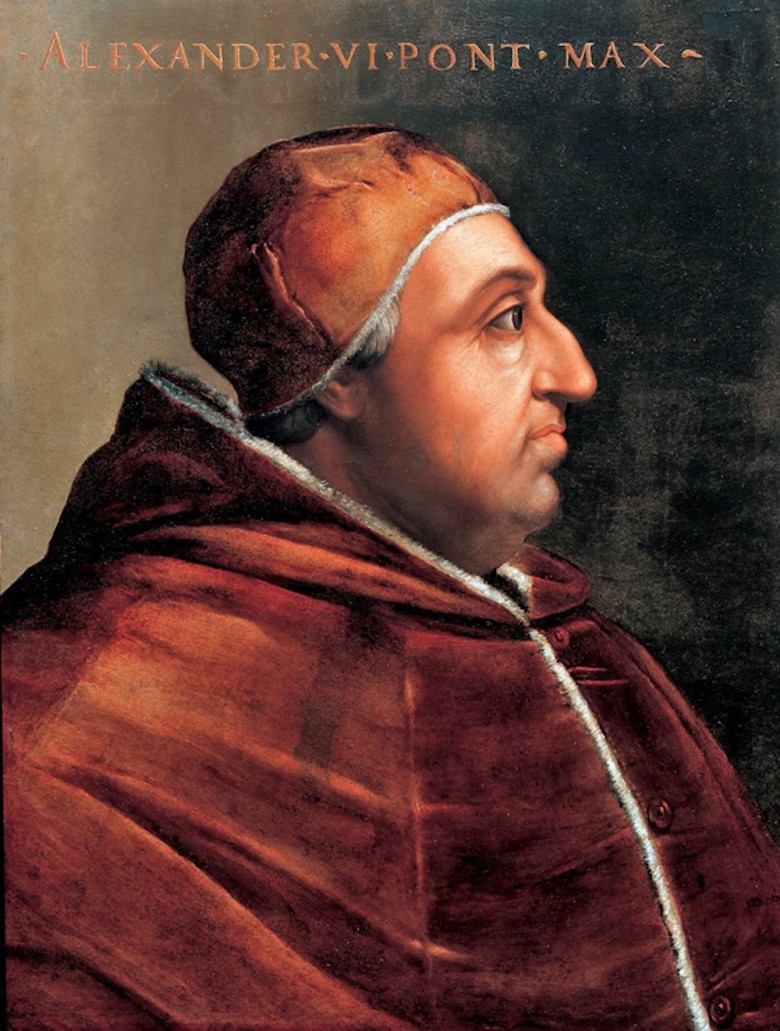“[Ultime parole in punto di morte] Va bene, va bene, arrivo. Aspettate un momento.”
Origine: Citato in l'Espresso, volume 43, edizioni 9-12, p. 28 ( Anteprima su Google Books http://books.google.it/books?id=rtvlAAAAMAAJ)
Alessandro VI, nato Roderic Llançol de Borja , italianizzato Rodrigo Borgia , è stato il 214º papa della Chiesa cattolica dal 1492 alla morte.
Fu uno dei papi rinascimentali più controversi, anche per aver riconosciuto la paternità di vari figli illegittimi, fra cui i famosi Cesare e Lucrezia Borgia, tanto che il suo cognome catalano, italianizzato in Borgia, è diventato sinonimo di libertinismo e nepotismo, che sono tradizionalmente considerati come le caratteristiche del suo pontificato. Tuttavia due dei successori di Alessandro, Sisto V e Urbano VIII, lo descrissero come uno dei papi più importanti dopo San Pietro.
Wikipedia

“[Ultime parole in punto di morte] Va bene, va bene, arrivo. Aspettate un momento.”
Origine: Citato in l'Espresso, volume 43, edizioni 9-12, p. 28 ( Anteprima su Google Books http://books.google.it/books?id=rtvlAAAAMAAJ)
“For the salvation of their soul.”
Pro salutae animae sua.
As pope, to Cardinal Ximenes on the why he saw no reason to hinder his son Cesare Borgia's renunciation of the Purple (August, 1498), as quoted in The Life of Cesare Borgia (1912) by Rafael Sabatini, Chapter V: The Renunciation of the Purple.
As pope, in a letter to the King of France, about the magnificence of his son Cesare Borgia (October, 1498), as quoted in The Life of Cesare Borgia (1912) by Rafael Sabatini, Book III The Bull Rampant, Chapter I: The Duchess of Valentinois.
“But may God, who grants pardon and loves to save man”
Quoted in, Material for a History of Pope Alexander VI, Peter de Roo, 2:378 http://babel.hathitrust.org/cgi/pt/search?q1=%22God%2C+who+grants+pardon+and+loves+to+save+man%22&id=mdp.39015013144061&view=1up&seq=9 http://www.attomelani.net/index.php/english/the-new-series-of-monaldi-sorti/the-doubts-of-salai/ Compare: For God loves saving, not condemning, and therefore He is patient with bad people, in order to make good people out of bad people." - St. Augustine, On the Verse of the Psalm: God Will Come Openly, (420-425), Sermon 18:2. Works of Saint Augustine, A translation for the 21st Century, (1990), Pt. III - Sermons, vol. I, (1-19), Edmund Hill, O.P.,translation and notes, John E. Rotelle, O.S.A., New City Press, New York, p. 374. Latin: Non enim amat Deus damnare sed salvare, et ideo patiens est in malos, ut de malis faciat bonos. http://www.augustinus.it/latino/discorsi/discorso_022_testo.htm http://books.google.com/books?id=Z2w7AQAAMAAJ&pg=PT10&dq=Non+enim+amat+Deus+damnare+sed+salvare,+et+ideo+patiens&hl=en&sa=X&ei=_c41U5u-BbTTsASR8oDwDQ&ved=0CC0Q6AEwAA#v=onepage&q=Non%20enim%20amat%20Deus%20damnare%20sed%20salvare%2C%20et%20ideo%20patiens&f=false
Contesto: But may God, who grants pardon and loves to save man, in his goodness, give strength to us and make prosperous the Holy See.
Report of the Ferrarese ambassador, Beltrando Costabili to Ercole I d'Este, Duke of Ferrara, February 1, 1502. Archives of Modena: As quoted in History of the City of Rome in the Middle Ages (1900), Ferdinand Gregorovius, George Bell & Sons, London, Volume 7, Part 2 (1497-1503), p. 486. http://books.google.com/books?id=kW1OAAAAMAAJ&pg=PA486&dq=%22often+told+him+that+Rome+is+a+free+city%22&hl=en&sa=X&ei=PQRlUeiiBIPA9QT4s4H4CA&ved=0CC4Q6AEwAA#v=onepage&q=%22often%20told%20him%20that%20Rome%20is%20a%20free%20city%22&f=false See also L. Pastor, History of the Popes, vol.6, p. 12. http://books.google.com/books?id=hk1DAQAAIAAJ&pg=PA112&dq=%22told+him+that+Rome+is+a+free+city%22&hl=en&sa=X&ei=ojZlUeS7Dob49QTTn4HQBw&ved=0CEUQ6AEwAg#v=onepage&q=%22told%20him%20that%20Rome%20is%20a%20free%20city%22&f=false. (Commonweal writes: “Whatever his faults, the Pope appears to have been of a forgiving and clement disposition, pardoning foes when he had them in his power, and becoming reconciled with those who had bitterly opposed him. With Savonarola — pulpit methods, by the way, were scarcely as novel and extraordinary then as our author (Peter de Roo) thinks — Alexander VI dealt on the whole rather patiently, more so, indeed, than our author, who is hardly fair to the friar.” -- Commonweal (1924), Commonweal Publishing Company, volume 1, p. 185. https://www.google.com/search?tbm=bks&hl=en&q=Whatever+his+faults%2C+the+Pope+appears+to+have+been+of+a+forgiving+and+clement+disposition&btnG=#hl=en&tbm=bks&sclient=psy-ab&q=%22Whatever+his+faults%2C+the+Pope+appears+to+have+been+of+a+forgiving+and+clement+disposition%22&oq=%22Whatever+his+faults%2C+the+Pope+appears+to+have+been+of+a+forgiving+and+clement+disposition%22&gs_l=serp.3...1287.1287.1.1562.1.1.0.0.0.0.79.79.1.1.0...0.0...1c.1.8.psy-ab.VnzmdIrn1SQ&pbx=1&bav=on.2,or.r_qf.&bvm=bv.44990110,d.eWU&fp=5b7686e7449457e7&biw=1294&bih=770)
“I am coming; I am coming. It is just. But wait a little.”
Last words (August, 1503), as quoted in The Life of Cesare Borgia (1912) by Rafael Sabatini, Book IV The Bull Cadent, Chapter I: The Death of Alexander VI
“May the Lord array thee in the garment of salvation and surround thee with the cloak of happiness.”
Inscribed words upon the mantle of gonfalonier given to his son Cesare Borgia (March 29, 1499), as quoted in The Life of Cesare Borgia (1912) by Rafael Sabatini, Chapter IV: Gonfalonier of the Church.